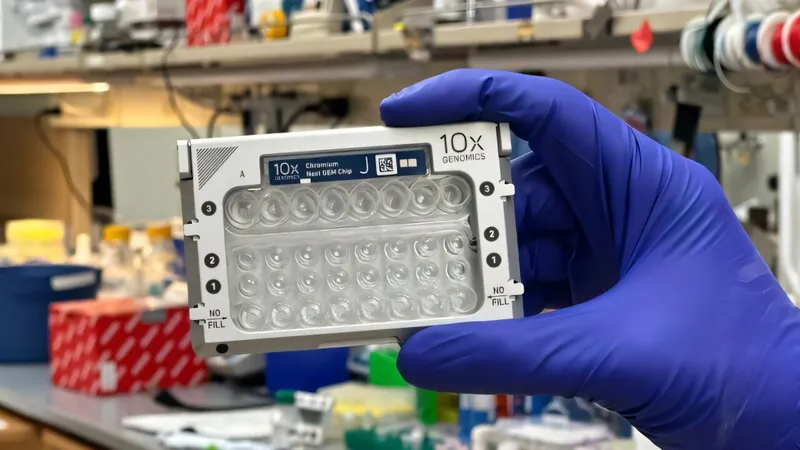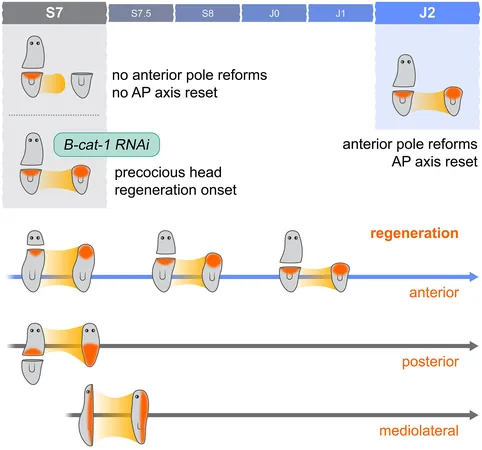
Revolutionary New Technique Could Transform Cancer Drug Screening!
2025-04-14
Author: Ming
Breakthrough in Cancer Research: Meet DEFND-seq!
Scientists at the Herbert Irving Comprehensive Cancer Center (HICCC) have unveiled an innovative, cost-effective technique known as DEFND-seq (DNA and Expression Following Nucleosome Depletion sequencing) that allows for scalable single-cell sequencing of both RNA and DNA. This revolutionary tool utilizes a microfluidics platform capable of processing thousands of cells simultaneously, offering a deeper insight into cancer progression, tumor evolution, and drug resistance.
Transforming Traditional Methods with Cutting-Edge Technology
Current sequencing methods fall short, analyzing only a few thousand cells at once and requiring cumbersome manual processes with multi-well plates. As Dr. Peter Sims, co-leader of the HICCC’s Precision Oncology and Systems Biology program, points out, "Traditional methods are limited in scalability and efficiency due to the high material costs and the need to handle cells individually. With DEFND-seq, we can effortlessly analyze tens of thousands of cells in parallel!"
From Lab Mistakes to Major Advancements
Interestingly, DEFND-seq emerged from an unexpected lab mishap. Dr. Sims, while managing experiments involving ATAC-seq, realized that by intentionally disrupting chromatin packaging, DNA could be sequenced more thoroughly. "We stumbled upon a game-changing approach by adjusting the ATAC-seq protocol to unlock the whole genome," he shares.
Targeting Treatment for Glioblastoma Patients
Under Dr. Sims’ guidance, postdoctoral researcher Tim Olsen has harnessed DEFND-seq to benchmark various glioblastoma samples, a particularly aggressive brain tumor with a grim median survival rate of just 15 months. The ability to test drug responses directly on intact tumor tissue could drastically improve treatment outcomes. "We can now perform drug screens on actual surgical resections, which allows us to see how different cell types, including non-tumor cells, respond to various treatments," says Sims.
Mapping Drug Resistance Like Never Before
Thanks to DEFND-seq’s high-resolution DNA profiling, researchers can pinpoint drug responses within distinct genetic subclones in heterogeneous tumors. This means identifying specific subclones that contribute to drug resistance, ultimately paving the way for more effective personalized treatment strategies.
A New Era in Cancer Therapy Awaits!
With the potential to enhance our understanding of tumor biology and improve drug screening processes significantly, DEFND-seq is setting the stage for a new era in cancer therapy. As researchers continue to innovate and explore this groundbreaking technique, the future of personalized medicine looks brighter than ever!


 Brasil (PT)
Brasil (PT)
 Canada (EN)
Canada (EN)
 Chile (ES)
Chile (ES)
 Česko (CS)
Česko (CS)
 대한민국 (KO)
대한민국 (KO)
 España (ES)
España (ES)
 France (FR)
France (FR)
 Hong Kong (EN)
Hong Kong (EN)
 Italia (IT)
Italia (IT)
 日本 (JA)
日本 (JA)
 Magyarország (HU)
Magyarország (HU)
 Norge (NO)
Norge (NO)
 Polska (PL)
Polska (PL)
 Schweiz (DE)
Schweiz (DE)
 Singapore (EN)
Singapore (EN)
 Sverige (SV)
Sverige (SV)
 Suomi (FI)
Suomi (FI)
 Türkiye (TR)
Türkiye (TR)
 الإمارات العربية المتحدة (AR)
الإمارات العربية المتحدة (AR)